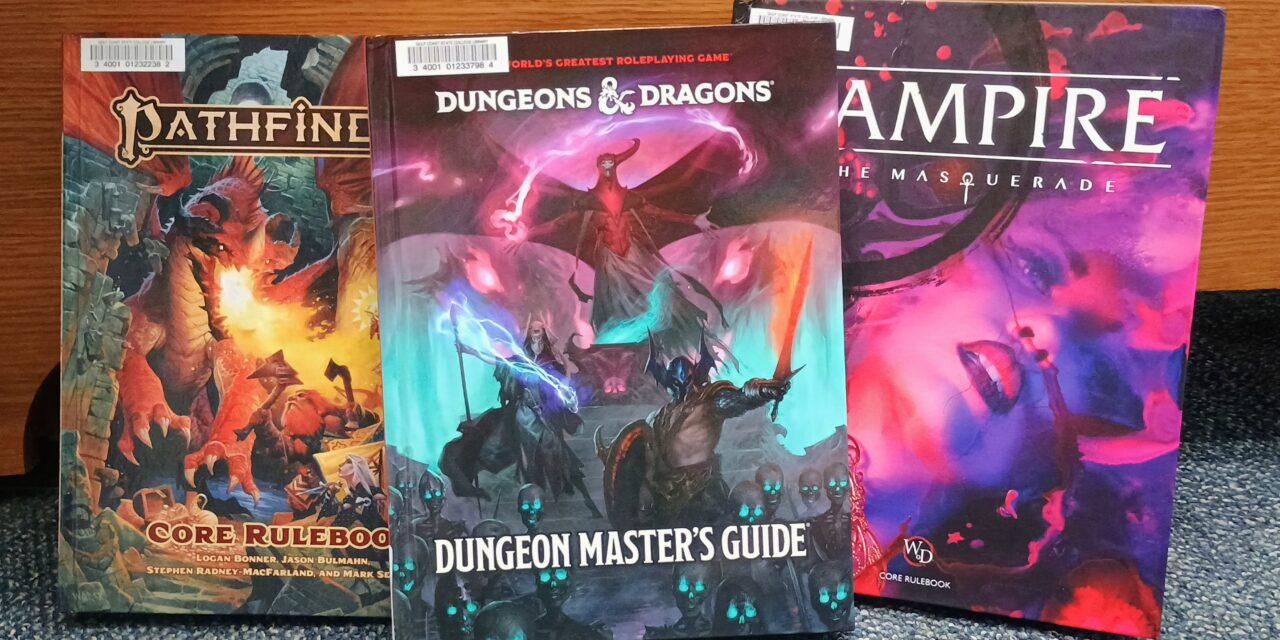Image Credits: Maddie Pierce
When it comes to TTRPGs, a group may have all their players and materials to play, but that isn’t everything they need. For many games to function, you need Game Master (GM) or Dungeon Master (DM) (Both words can be used interchangeably), but with that comes questions like:
- What is a Game Master?
- What the purpose of a Game Master
- How hard is it to be a Game Master?
To find out, three different Game Masters with varying levels of experience were interviewed to help provide details to get a better grasp.

Benjamin Grey Gadston interview
The first person interviewed was Benjamin Grey Gadston who stated that they had be DMing since October of 2024. He additionally stated his DMing experience had included a campaign and a one shot. A Dungeons and Dragons module named “Tyranny of Dragons” and the other using the official Star Wars TTRPG. When asking about what problems a DM would face when DMing, he answered that the players would be the first obstacle for Dungeon Masters because of how players can be unpredictable and possibly derail the story. He gives some advice to help mitigate some of that risk by having the keeping several things close to one space and pacing yourself with DMing for a smaller group rather than a larger one. When asked if there were problems DMs would face that a player would not, he stated one of the biggest problems that DM has to deal with is scheduling. When asked what their preferred style of DMing was, they stated that their preferred style was to have a preplanned sessions where the players drive the plot toward planned or unplanned outcomes. When asking if they have used any other styles of DMing, he said that he hadn’t possibly due to how new he is to DMing. When asked about their prepared notes and their details, he stated he would pull all-nighters a few days priorly to work on the notes and that the notes are highly detailed and in-depth to prepare for various outcomes. When asked how often they have to improvise for outside of their notes, he stated it is situational because of how he usually plans for that in his notes. When asked if players should try DMing, he stated that can be a fun experience and everybody should at least try it once. Additionally, he stated that a person should not be perpetually stuck as a “Forever DM” and that everybody should at least have or gain the experience of DMing. When asking if experience as a player matters when it comes to DMing, he stated it doesn’t really matter and you can just dive right into it because anybody can be a DM, but having experience as a player to before DMing may improve your experience as a DM. When asking what tools or assistance would be helpful to people picking up DMing, he suggested the various resources for Dungeons and Dragons including the Dungeon Master’s Guide, Monster Manual, D&D Beyond, and some of the preexisting settings and modules. Additionally, he stated you could also search the internet for tips, tricks, and resources to better your skills. When asking what new DM should avoid doing, he stated to avoid overloading yourself or try comparing your skills to other DMs as can be exhausting and limiting to yourself. When asked about what problems do new DMing face, he stated that stress can be the biggest problem for newer DMs as many of the other possible problems and hiccups can accumulate into stress. When asked how to best deal with those problems, he stated taking occasional breaks for what ever reason helps as you decompress, breathe, chat with others, eat, many other things to better readjust. When asked what advice you would give player when it comes to a new DM DMing, he stated that players should help the new DM with some rules or mechanics while give advice and feedback, but also to be careful not to overload the new DM with your information or actions. When asked what players should avoid doing when it comes to a new DM DMing, he stated that the players should be respectful and should not try to upset the new DM nor should they try to be a “murderhobo” (a person who doesn’t control their actions and like to choose a surprise option of murder). Additionally, he stated that both players and DM should talk about what topics in the story they should avoid when it comes to what people are comfortable dealing with before they play the game, so that everybody can enjoy the game they play. When asking about what a session 0 is, he stated that it was the pregame set up where people build their characters, talk about game scheduling, explain details about the game or story, talk about what topics in the story people may or may not be comfortable with, and sometimes may include a prologue of the game. When asked what makes a session 0 important, he stated it is a bonding exercise for everybody that helps each person know more about each other and each other’s characters. When asked what he thought a session 0 needs to contain, he stated that introductions for everybody and their characters, rules and setting explanation, and scheduling. When asked what systems would be easy to learn and run for a DM, he stated that Dungeons and Dragons 5th Edition and maybe Pathfinder because they are fairly recent, updated, and streamlined. When asked what systems they wouldn’t suggest for newer players until they are more experienced, he stated Dungeons and Dragons 3rd and 4th Edition, Cyberpunk, and Call of Cthulhu, due to their complexity and expensive nature while 3rd Edition was also “3rd Edition”. Additionally, he added that Pathfinder could sometimes apply to this as it can be more complex than Dungeons and Dragons 5th Edition and is “always a good second option”. When asked if familiarity, accessibility or simplicity was a more important factor when it comes to learning a new game, he stated that familiarity and accessibility were the most important factors, but it’s up to what the DM thinks would work best. When asking what genres of TTRPG DMs should avoid or work their way up to, he stated more “realistic” or “grounded in realism” genres (which he stated included horror and science fiction) with games in those genres being Cyberpunk, Starfinder, or Mutants and Masterminds. To further verify his thoughts, when asked what his opinions on DMing were, he stated it was One of his favorite parts of playing Dungeons and Dragons because loves hanging out with his player, telling stories, he likes being pretending to be to be his NPCs (non-player character), and he loves the creativity of it all. To end the interview, I asked what his thoughts on other people DMing was, he stated people usually seem to do pretty well and from his experience he had never had to deal with a bad DM.

Madison Furlong interview
The second person I interviewed was Madison Furlong who stated that they have been DMing since earlier 2023. She stated that at the time she only DMs for Dungeons and Dragons. When asking about what problems a DM would face when DMing, she answered that keeping up with some of the mechanics, keeping up with some of the math, and improvisation for unexpected surprises from players. When asked what their preferred style of DMing was, they stated her style isn’t necessarily linear, but where players are able to drift with the narrative where she can flexibly direct the plot where the players can subtly change the story. When asking if they have used any other styles of DMing, she said she has dabbled in a more open world storytelling manner of style. When asked about their prepared notes and their details, she stated her notes mainly revolve around plot points. The details of which could be as simple as a single word or several paragraphs long. When asked how often they have to improvise for outside of their notes, she stated that she has to do it a lot as player will try to do a lot of things. When asked if players should try DMing, she stated they should if they feel up for it and stated various ways how the experience of a player and a DM vary when it comes to the game. When asking if experience as a player matters when it comes to DMing, she stated that the experience is helpful as it gives more understanding of the complexity of the games mechanics rather than relatively going in blind. When asking what tools or assistance would be helpful to people picking up DMing, she suggested to find digital ways to reference rules, track stats and for random generation because it’s easier to open a tab with that information rather than to find it in on paper. When asking what new DMs should avoid doing, she stated thinking that your story is a novel with a rigid plot because players will feel like they are being railroaded (the story only happens on a specifically set path) and that they don’t have influence on the story. When asked about what problems do new DMing face, she stated they could be ill prepared. When asked how to best deal with those problems, she stated using a module help mitigate those problems because if you don’t have something prepared then you can fall back on what the module has prepared. When asked what advice you would give player when it comes to a new DM DMing, she stated that they should be patient, be forgiving if they make a mistake, give helpful feedback. When asking about what a session 0 is, she stated that it is a when players would build their characters, find out what topics each player is comfortable with, and have expectations set. When asked what makes a session 0 important, she stated it helps people understand what they are getting into and so they can make a game which suits the players so everybody can enjoy the game. When asked what he thought a session 0 needs to contain, she stated the over view of the setting, the hook of the story, player expectation, and going over lines and veils (lines are not crossed and will not be seen while veils you won’t really see but it is alluded to). When asked what systems would be easy to learn and run for a DM, she stated she only knows Dungeons and Dragons, but she heard that the Masks system and the Avatar the last Airbender TTRPG are fairly beginner friendly and are probably simpler than Dungeons and Dragons. When asked what systems they wouldn’t suggest for newer players until they are more experienced, she stated very mechanic heavy and number crunchy systems with an example they gave being G.U.R.P.S. (Generic Universal Role Playing System). When asked if familiarity, accessibility or simplicity was a more important factor when it comes to learning a new game, she stated familiarity because if you know basics then it is not too hard to continue. When asking what genres of TTRPG DMs should avoid or work their way up to, she stated that grimdark was one that is pretty difficult to put off in a as it can without it being edgy or shocking just because. To further verify her thoughts, when asked what his opinions on DMing were, she stated that it is fun, a great creative outlet, and is never boring. To end the interview, I asked what his thoughts on other people DMing was, she stated that it is interesting to see other people’s style and how it is different from hers.

McKenna Beote interview
The last person I interviewed was Makenna Beote who stated she has been playing TTRPGS for six years and has been GMing since 2019. When asking about what problems a GM would face when GMing, she answered that people may clash with each other or her outside of the game in way that are not easy to deal with. When asked what their preferred style of GMing was, she stated that her style was roleplay heavy with it a lot of involvement players and topics. When asking if they have used any other styles of GMing, she said that she did not. When asked about their prepared notes and their details, she stated she does not prepare notes for her sessions. When asked if players should try GMing, she stated that players should if they interested as it is a great opportunity to share your creativity with your friends. When asking if experience as a player matters when it comes to GMing, she stated it does not matter as and the only part of being a play you would need to know when GMing is the rules of how to be a player, but that information is not necessary. When asking what tools or assistance would be helpful to people picking up GMing, she suggested any online resources you can obtain with example they gave being Youtube, D&D Beyond, and any other “free material” as they are full of resources that can help be a better GM. When asking what new GM should avoid doing, she stated they should avoid being quiet and incase you need to speak up about something, if something is causing someone discomfort, and to have better communication with your players. When asked about what problems do new GMing face, she stated that time and pacing are some problems new GMs may face as they can big issue and people can lose track of time. When asked what advice you would give player when it comes to a new GM GMing, she stated that players need patience and understanding to help work with them to make a story. When asking about what a session 0 is, she stated it was a moment before the game begins where people can talk about the rules, character creation, world lore, and the use of veils and cards (another name for lines and veils). When asked what makes a session 0 important, she stated the communication of it helps the players get a feel of each other and learn about each other outside of the game. When asked what he thought a session 0 needs to contain, she stated a black list of triggers not to be brough up in the game has to be included in a session 0. When asked what systems would be easy to learn and run for a GM, she stated Dungeons and Dragons 5th Edition as it functions as a dive in the deep end where when you learn its mechanics you can use that knowledge as a diving point for many other TTRPGs. When asked what systems they wouldn’t suggest for newer players until they are more experienced, she stated she wouldn’t suggest any system based on a preexisting IP or movie media it’s better to get a better grip of the other systems before learning themed and specialized content TTRPGs (an example of specialized content being dice that don’t use numbers or instead use some type of media specific symbol). When asked if familiarity, accessibility or simplicity was a more important factor when it comes to learning a new game, she stated accessibility is the most important as anyone can make a game fun, but being able to have access to it. When asking what genres of TTRPG GMs should avoid or work their way up to, she stated to avoid any hyper realistic or survival type games as it can become daunting and quickly drain people having to deal with and remember mechanics for like eating, hydration, spoilage or things in that nature. To further verify his thoughts, when asked what his opinions on GMing were, she stated that she loves GMing. To end the interview, I asked what his thoughts on other people GMing was, she stated it’s a good experience and encourages people to look into it.
From the information provided the priorly posed questions can be answered. A Game Master is a storyteller who uses a TTRPG system to make a story with the help of players who function as characters the story follows. The purpose of a Game Master is to make stories with other people and have fun. With how the interviewees describe GMing, it is probably not to difficult to learn as they provided several resources for getting into it.
Maddie Pierce
Student Writer - Spring 2025










